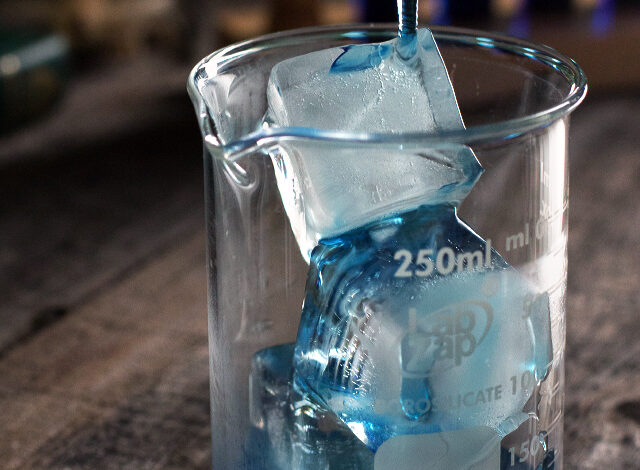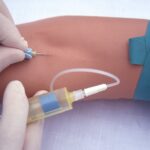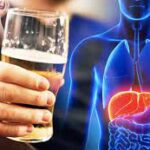Can I Drink Hydrogen Peroxide?

Hydrogen peroxide is a chemical compound with the formula H2O2. In its pure form, it is a very pale blue liquid, slightly more viscous than water. It is used as an oxidizer, bleaching agent, and antiseptic, usually as a dilute solution (3–6% by weight) in water for consumer use, and in higher concentrations for industrial use. Concentrated hydrogen peroxide, or “high-test peroxide”, decomposes explosively when heated and has been used as a propellant in rocketry.
Hydrogen peroxide is a reactive oxygen species and the simplest peroxide, a compound having an oxygen–oxygen single bond. It decomposes slowly when exposed to light, and rapidly in the presence of organic or reactive compounds. It is typically stored with a stabilizer in a weakly acidic solution in a dark bottle to block light. Hydrogen peroxide is found in biological systems including the human body. Enzymes that use or decompose hydrogen peroxide are classified as peroxidases.
Hydrogen peroxide is a mild antiseptic used on the skin to prevent infection of minor cuts, scrapes, and burns. It may also be used as a mouth rinse to help remove mucus or to relieve minor mouth irritation (e.g., due to canker/cold sores, gingivitis). This product works by releasing oxygen when it is applied to the affected area. The release of oxygen causes foaming, which helps to remove dead skin and clean the area.
Hazards Associated with Hydrogen Peroxide
In high concentrations in laboratory or industrial settings, hydrogen peroxide can pose serious health and safety hazards. Hydrogen peroxide is a strong oxidizer (moderate oxidizer in lower concentrations), and can be corrosive to the eyes, skin, and respiratory system. This chemical can cause burns to the skin and tissue damage to the eyes.
Take special caution to avoid contact with hydrogen peroxide mist. Household-grade concentrations of this chemical are generally considered safe to use, but should never be ingested. Due to these potential hazards, hydrogen peroxide should be handled with care.
What Will Happen If I Drink Hydrogen Peroxide
Diluted hydrogen peroxide products, which typically contain about 3 percent hydrogen peroxide, are safe for regular household use, but hydrogen peroxide poisoning can occur following ingestion or inhalation of hydrogen peroxide compounds or fumes.
Hydrogen peroxide in more concentrated forms, for example solutions that contain 30 percent hydrogen peroxide, can be hazardous if not handled properly. These higher concentrations of hydrogen peroxide may be found in industrial settings where bleaching textiles and paper takes place.
The National Institute for Occupational Safety and Health’s permissible exposure limits for hydrogen peroxide at higher concentrations is 1 part per million over an 8-hour work shift. Inhalation of hydrogen peroxide in the form of vapors, mists, or aerosols can cause asphyxiation in poorly ventilated areas.
Diluted hydrogen peroxide products containing 3 to 5 percent hydrogen peroxide are not easily absorbed through intact skin, but they can be mildly irritating to mucus membranes. Ingestion of hydrogen peroxide of any volume is not recommended.
What are the Signs and Symptoms of Hydrogen Peroxide Poisoning?
The signs and symptoms of Hydrogen Peroxide Poisoning can vary from one individual to another. It may be mild in some and severe in others. The signs and symptoms may include:
• Watering or redness of eyes; eye irritation
• Burning pain in the mouth, throat, and in the food-pipe; severe burns
• Skin irritation (on exposure to skin); whitish skin patches
• Vomiting (blood in vomit)
• Cramping stomach or abdominal pain
• Breathing difficulties and chest pain
• Bluish discoloration of lips and beneath fingernails
• In rare cases, seizures
How is First Aid administered for Hydrogen Peroxide Poisoning?
First Aid tips for Hydrogen Peroxide Poisoning:
• Call 911 or your local emergency help number immediately, for emergency assistance
• Call the Poison Control Center at 1-800-222-1222 (or your local poison control center) for further instructions
• Provide them with information such as the compound taken, quantity and time of ingestion, age, weight and general health status of affected individual
• Confirm that the airways are protected; also, ensure breathing and the presence of pulse
• If skin exposure or involvement of the eye has occurred, then wash thoroughly with copious amounts of water (for at least 15 minutes)
• Unless instructed by a healthcare professional, DO NOT induce vomiting in the affected individual
• Take individual to emergency room (ER) for further treatment
• Always try to take the medication strip/bottle/container to the ER
The emergency medical health professional might perform the following steps towards treating the condition:
• Medically manage symptoms and provide breathing support, if necessary
• Wash skin and eyes repeatedly and thoroughly (irrigation), to eliminate any remaining hazardous compound
• Following this, a suitable skin or eye ointment may be used to treat the exposure
• Administer fluids by an intravenous drip line
• Gastric tube, in case of gas pressure buildup in the stomach
Who should administer First Aid for Hydrogen Peroxide Poisoning?
First aid for Hydrogen Peroxide Poisoning is administered by healthcare professionals.
• The individual who is affected, or someone near, should call 911 for emergency assistance (or the local emergency number)
• They should also call the poison control center at 1-800-222-1222 (or the local poison control center) and follow instructions
What is the Prognosis of Hydrogen Peroxide Poisoning?
• The prognosis of Hydrogen Peroxide Poisoning is dependent on the amount of substance consumed, time between consumption and treatment, severity of the symptoms, as well as general health status of the patient
• If the individual can recover from the symptoms, with appropriate medication and early support, the outcome is generally good. With prompt treatment, severe eye and skin exposure symptoms may be prevented
• Generally, household use compounds are low in hydrogen peroxide concentration levels than industrial-grade hydrogen peroxide chemical compounds (that are of higher concentration levels). They type of hydrogen peroxide product ingested also dictates the prognosis
In general, toxicities are common situations in the emergency departments. A majority of the cases are often not fatal, when appropriate treatment is given.
How can Hydrogen Peroxide Poisoning be Prevented?
Hydrogen Peroxide Poisoning can be prevented by:
• Keeping cosmetics, medications, and other healthcare products out of reach of children in child-proof containers
• Using appropriate protective wear when working with such chemicals
• Be aware of basic first aid steps in case of an emergency (such as inadvertent poisoning)
What are certain Crucial Steps to be followed?
• Call 911 (or your local emergency number) for emergency assistance, if symptoms are life-threatening
• Call Poison Control Center at 1-800-222-1222 (or the local poison control center) and follow the recommend steps
• It would be helpful if the following information is readily available:
o Type, amount and time of consumption of the substance
o Age and weight of the individual
o And, the overall health status of the individual



